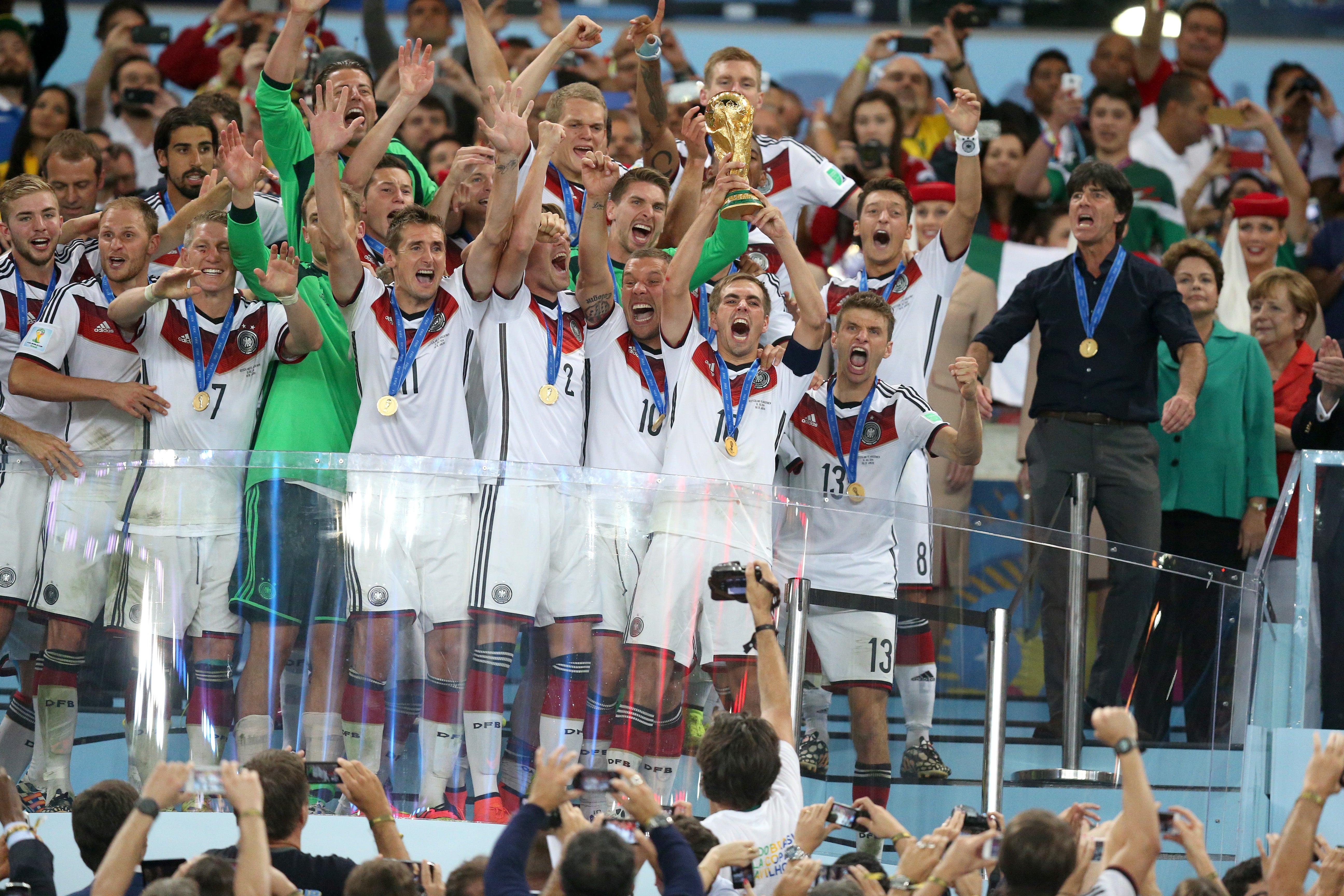
Germany will look to restore their reputation as one of the most-feared sides in international football as they seek a record-equalling fifth World Cup trophy this winter.
Die Mannschaft became four-time world champions by triumphing in Brazil in 2014, overcoming Argentina in extra time of a tense final to add a fourth star – “der vierte Stern” – to their jersey. With that win, which ended Germany’s 24-year longing for a world title (and 18-year wait for major silverware), coach Joachim Low earned his place in the nation’s footballing history.
However, his team then suffered from the recent curse of World Cup winners exiting the subsequent world championship in the group stage, as Germany endured a torrid tournament in Russia in 2018 to bow out in meek fashion. It was a shocking showing from a national team that had reached the semi-finals of the Euros just two years earlier. Not since Euro 2004 had the country failed to qualify for the knockout stages of a competition.
They improved upon their 2018 effort last summer, as they squirmed through a tense ‘group of death’ behind world champions France and narrowly ahead of Portugal, who qualified as one of the best third-placed teams. Germany then fell to a rare defeat by rivals England in the last 16, however, losing 2-0 at Wembley Stadium in London to bring their tournament to an end – as well as the reign of Low, whose replacement was announced as Hansi Flick ahead of the competition.
Flick, a former Germany assistant coach and German FA sporting director, left his post as Bayern Munich coach to replace Low, and it has been the 57-year-old’s job to rejuvenate the team ahead of his first competition as coach: this winter’s World Cup, where Germany join Spain, Costa Rica and Japan in Group E.
Here is everything you need to know:
Group fixtures (all times GMT)
Wednesday 23 November: Germany vs Japan – 16:00
Sunday 27 November: Spain vs Germany – 22:00
Thursday 1 December: Costa Rica vs Germany – 22:00

Confirmed squad
Goalkeepers: Manuel Neuer (Bayern Munich), Marc-Andre ter Stegen (Barcelona), Kevin Trapp (Eintracht Frankfurt)
Defenders: Antonio Rudiger (Real Madrid), Niklas Sule (Borussia Dortmund), Thilo Kehrer (West Ham), Nico Schlotterbeck (Borussia Dortmund), Matthias Ginter (Freiburg), David Raum (RB Leipzig), Lukas Klostermann (RB Leipzig), Armel Bella-Kotchap (Southampton), Christian Gunter (Freiburg).
Midfielders: Ilkay Gundogan (Manchester City), Kai Havertz (Chelsea), Joshua Kimmich (Bayern Munich), Marco Reus (Borussia Dortmund), Leon Goretzka (Bayern Munich), Jamal Musiala (Bayern Munich), Julian Brandt (Borussia Dortmund), Jonas Hofmann (Borussia Monchengladbach), Karim-David Adeyemi (Borussia Dortmund), Niclas Füllkrug (Werder Bremen), Mario Gotze (Frankfurt)
Forwards: Thomas Muller (Bayern Munich), Serge Gnabry (Bayern Munich), Leroy Sane (Bayern Munich), Youssoufa Moukoko (Borussia Dortmund)
Ones to watch
Star – Kai Havertz: The Chelsea midfielder, who can also play as a false No9 and wide forward, has 10 goals from 30 appearances for his country, and at his first international tournament last summer, the 23-year-old netted in back-to-back games against Portugal and Hungary. In doing so, Havertz proved he can perform for Germany on the biggest stage – just as he did at Chelsea with his Champions League-winning goal last spring. In the Nations League this September, he scored a brace against England at Wembley.

Breakout talent – Jamal Musiala: The 19-year-old featured for England at youth level before committing to Germany, for whom he has now made 17 appearances. The Bayern Munich attacking midfielder has minor experience at a major international tournament, having come off the bench for cameos against Hungary and England at last year’s Euros, but he could feature much more heavily this winter...
Odds to win the World Cup (taken from Betfair)
9/1
Prediction
Germany had clearly reached the end of their cycle with Joachim Low even before their last-16 exit to England at last summer’s Euros. Their dismal World Cup campaign in 2018 marked the nadir of the former coach’s time in charge and the point at which they should have refreshed their leadership. They have now done so, however, and Flick was a fine choice of replacement, capable of leading die Mannschaft back to their best. This World Cup may come too soon for Flick’s incarnation of Germany, but they should still be aiming for the latter stages of the competition and are arguably being unfairly overlooked – in favour of nations with fine squads but weaker mentalities, like Spain and Brazil. Defeated in the semi-finals.




.jpg?w=600)


